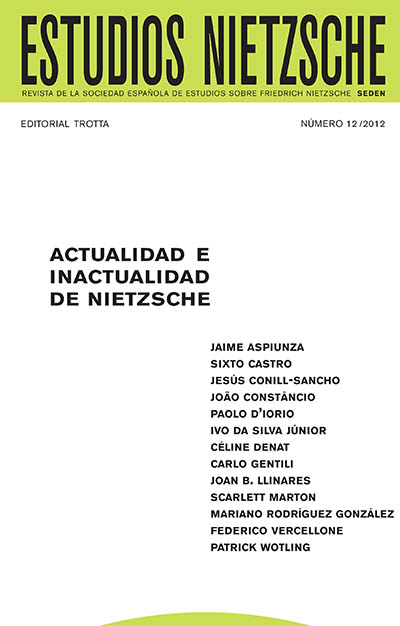Knowing Drives. Would it be appropriate to talk about a Nietzschean Epistemology?
DOI:
https://doi.org/10.24310/EstudiosNIETen.vi12.10561Keywords:
truth, justice, objectivity, realityAbstract
The truth subject, and the truth levels that it distinguishes, would be the core of Nietzsche’s Theory of Knowledge. Departing from a quite important Heideggerian interpretation, this paper explores that most peculiar sameness of knowledge and art which would mean to understand truth as justice. So that Nietzsche’s Theory of Knowledge will devote its efforts to let us see that justice taken as objectivity but in the first place as reality approval. These aims will justify by themselves Nietzschean reflection on knowledge, always understood as a fighting-and-(provisional) peace relation among drives.
Downloads
Metrics
References
Abel, Günter, «Bewusstsein-Sprache-Natur: Nietzsches Philosophie des Geistes»: Nietzsche-Studien 30 (2001), 1-43.
Arana, J. Ramón, «Nietzsche: de Heráclito al mundo»: Estudios Nietzsche 11 (2011), 13-25.
Babette Babich, B., «Un problema con cuernos. el problema de la ciencia misma»: Estudios Nietzsche 8 (2008), 13-53.
Clément Rosset, Cément, La fuerza mayor. Notas sobre Nietzsche y Cioran.
Gori, Pietro, «The Usefulness of Substances. Knowledge, Science and Metaphysics in Nietzsche and Mach»: Nietzsche-Studien [2009], 111-155.
Granier, J. Le probléme de la vérité dans la philosophie de Nietzsche, París, du seuil, 1966.
Heidegger, M., Nietzsche I. «La voluntad de poder como conocimiento», trad. de J. L. Vermal, Barcelona: Destino, 2000.
Henry, Michel, (1985), Genealogía del psicoanálisis, prólogo de M. García-Baró y trad. de J. Teira y R. Ranz, Madrid: Síntesis, 2002.
Lange, F. A Geschichte des Ma- terialismus und Kritik seiner Bedeutung in der Gegenwart, 2 vols., Waltrop/Leipzig: Thomas Hoof KG, 2003.
Nietzsche, F., Obras Completas, I-IV (OC ). Director ed. Diego Sánchez Meca. Madrid: Tecnos, 2011-2016
Nietzsche, F., Correspondencia I-VI. (CO). Director ed. Luis E. de Santiago Guervós. Madrid : Trotta, 2005- 2012.
Nietzsche, F., Fragmentos Póstumos I-IV (FP). Director ed. Diego Sánchez Meca. Madrid: Tecnos, 2006-2010.
Sánchez Meca, D., Nietzsche. La experiencia dionisíaca del mundo, Madrid: Tecnos, 42009.Schopenhauer, A., El mundo como voluntad y representación, trad. de Roberto R. Ara- mayo, Barcelona / Madrid: Círculo de Lectores /
Spir, A., Denken und Wirklichkeit: Versuch einer Erneuerung der kritischen Philosophie, Leipzig: J. G. Findel, 1873.
Stack, G.J., Lange and Nietzsche, Berlin/New York: de Gruyter, 1983.
Zambrano, María, El hombre y lo divino, Madrid: FCE, 2007.
Downloads
Published
How to Cite
Issue
Section
License
As of issue 21 (2021) this journal is published only in open access (diamond route).
From that number 21, like the previous numbers published in NIETZSCHE STUDIES, they are subject to the Creative Commons Acknowledgment-NoComercia-ShareIgual 4.0 license, the full text of which can be consulted at <http://creativecommons.org/licenses/by-nc-sa/4.0 >
It is the responsibility of the authors to obtain the necessary permissions of the images that are subject to copyright.
This work is licensed under a Creative Commons Attribution-NonCommercial-ShareAlike 4.0 International License.
Copyright generates two different rights: moral rights and patrimonial rights that EJFB recognizes and respects. Moral rights are those relating to the recognition of the authorship. They are rights of a personal nature that are perpetual, inalienable, unseizable and imprescriptible as consequence of the indivisible union of the author and his/her work.
Patrimonial rights are those that can be derived from the reproduction, distribution, adaptation or communication of the work, among others.







11.png)
